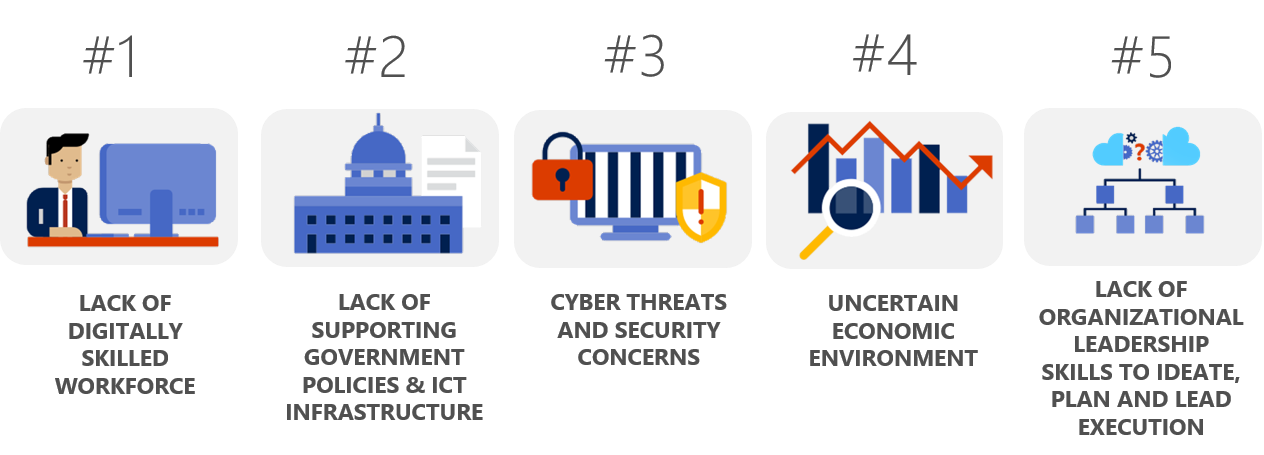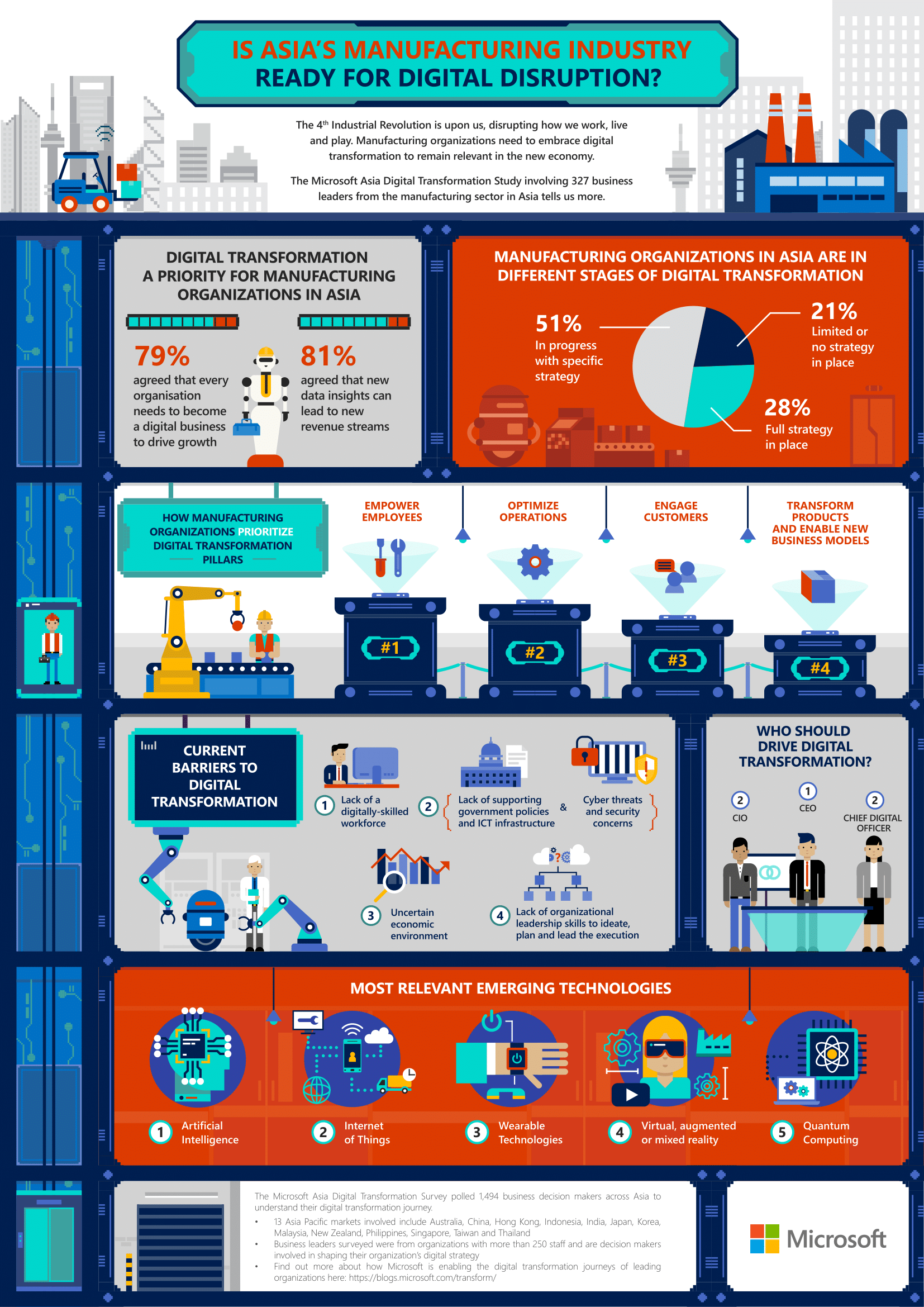Business leaders in Asia Pacific’s manufacturing sector are showing urgency in embracing the 4th Industrial Revolution, where 79% of them believe that they need to transform to a digital business to enable future growth and yet only 28% said that they have a full digital strategy in place today. These are some of the key findings of the Microsoft Asia Digital Transformation Survey[1] to understand how business leaders in the manufacturing sector are embracing the digital era.
Technology advancements have ushered in the 4th Industrial Revolution, where cutting-edge technologies such as Internet of Things (IoT), artificial intelligence (AI), advanced data analytics, and mixed reality are powered by cloud computing to create limitless possibilities in transforming the way people work, live and play. This revolution, together with rapid urbanisation, emergence of the millennial workforce and a fragile global economic climate, is ushering societal and economic changes at an unprecedented pace.
The Microsoft Asia Digital Transformation Study surveyed 1,494 business leaders from Asia Pacific working in organisations with more than 250 employees from 13 Asia Pacific markets: Australia, China, Hong Kong, Indonesia, India, Japan, Korea, Malaysia, New Zealand, Philippines, Singapore, Taiwan and Thailand. All respondents were pre-qualified as being involved in shaping their organisations’ digital strategy, including 327 from the manufacturing sector.
Even as majority of business leaders are aware of the urgent need to transform digitally to address the changing business climate, the study found that the transformation journey for most manufacturing organisations in Asia is still at its infancy. In fact, only 28% of business leaders indicated that they have a full digital transformation strategy in place, and 51% are in progress with specific digital transformation initiatives for selected parts of their business. 21% still have very limited or no strategy in place.
Andrés Ortola, Director of the Enterprise and Partners Group, Microsoft Singapore, said: “The Microsoft Asia Digital Transformation Study has shown that Asia’s manufacturing sector has started to act on the need for digital transformation to address the challenges and opportunities of Industrie 4.0 in the region. However, these organisations are not acting fast enough to capitalise on the value of latent data to better meet the needs of customers. We urge all business leaders in this sector to digitally transform themselves to stay relevant in a highly disrupted market.”
“At Microsoft, we believe this involves transformation in four key pillars – empowering employees, engaging customers, optimising operations and transform with new products, services or business models, and data and the cloud are key enablers of these”, added Ortola.
Clear Priorities for Digital Transformation but True Transformation Lacking
Microsoft has defined what it means to transform in four key pillars:
1. Engage customers: Consumers are savvier than ever before, with access to data ensuring they are often educated on a product or service before engaging. Manufacturing organisations need to reimagine the client experience and transform itself from an asset-focused to a customer-centric entity. This will enable organisations to ultimately drive increased relevance, customer loyalty and profitability.
2. Empower employees: The nature of how we work—and the workplace itself—has undergone a dramatic evolution. It is now crucial to connect the workforce to the information they need in their roles in order to be able to manage assets and processes in real time. This will enable organisations to innovate faster, and improve output while ensuring compliance requirements are met.
3. Optimise operations: With vast stores of data generated across the manufacturing floors, finding useful insights become a challenge for business leaders. Organisations can tap on emerging technologies to gain breakthrough insights and act on real-time intelligence to optimise processes, performance profitability.
4. Transform products & business models: The opportunity to embed software and technology directly into products and services is evolving how organisations deliver value, enabling new business models, and disrupting established markets. Manufacturing organisations can now drive agility with open and connected systems with highly-automated digital processes to support new product development in order to optimise distribution channel strategies, while meeting the security, privacy and transparency expectations of customers, regulators and shareholders.
The Study shows how business leaders in the manufacturing sector are prioritising their digital transformation strategies:

Said Ortola: “Customer insights is the new currency for manufacturing organisations, and 81% of business leaders agreed that new data insights would lead to new revenue streams. However, it is concerning to see that while there is widespread acknowledgement on the need to transform, they are only doing so incrementally. With constant pressure from newer and more agile players, the transformation of products and new revenue models provides the greatest opportunity for organisations to truly lead rather than be disrupted. Leaders need to rethink business models, find new data insights which lead to new revenue streams. And they need to do this by embracing a different way of bringing together people, data, and processes. which create value in a new digital business.”
Emerging Technologies in Demand
Cloud computing and the decreasing cost of devices have made it more affordable for organisations to transform digitally, according to 80% of manufacturing business leaders surveyed. Majority also (80%) regarded cloud computing as essential in their digital transformation strategy.
In the next 12 to 18 months, business leaders in Asia Pacific’s manufacturing sector are interested to explore a range of emerging technologies to accelerate and achieve digital transformation. The top technologies identified by business leaders as being relevant to them are:
- Artificial intelligence: Intelligent machines or software that are able to learn and perform tasks independently. Examples include robots, chatbots and self-driving cars;
- Internet of Things (IoT): Network of sensors embedded into devices that can collect data or be remotely controlled. Examples include smart buildings, cars and home devices;
- Wearable technologies: Advanced computing and electronic technologies that are embedded into clothing, devices or bodies. Examples include smart watches and fitness trackers;
- Quantum computing: Next-generation computers using different computation systems to solve data equations much faster than traditional computers
- Virtual/ augmented/ mixed reality: Technologies enabling the merging of real and virtual worlds into new and immersive experiences. Examples include Microsoft HoloLens, Oculus Rift, and 3D video gaming.
Ortola added: “Emerging technologies, specifically, cloud, analytics and new capabilities like AI and IoT will give organisations new capability to transform. But real transformation only happens when they bring their people along with them. Equipping employees with the right tools to enable them to be part of solution to be more responsive, data driven and customer centric are also key.”
Barriers to Digital Transformation in Asia Pacific
While there is no doubt that digital transformation will bring significant benefits for both businesses and employees, the path to digital transformation has been slow, given that only 27% have a full digital strategy in place.
According to business leaders in the study, the top barriers to digital transformation faced by Asia’s manufacturing industry are, in order of priority:

Increasing security threats in today’s digital economies is real and cannot be ignored. There is a continued perception among business leaders that the cloud is less secure. However, they may be less privy to the advances being made in the cloud on security and privacy and need more exposure on how, with the current threat environment, it will be safer being in the cloud than relying on tradition forms of IT. In fact, a recent Microsoft Asia Pacific survey of 1,200 IT leaders [1] conducted in September 2016 found that 87% believe that in the longer term, the cloud will be safer.
“People don’t use technology that they don’t trust. This is a golden rule that applies to organisations and individuals alike as we live in a mobile-first and cloud-first world. Ensuring security, privacy, and compliance are key to enabling manufacturing organisations to carry out digital transformation with confidence. As such, protecting sensitive data requires a new and integrated approach, all of which we have invested in significantly,” said Ortola.
Microsoft’s mission is to empower every person and every organisation on the planet to achieve more—building technology so that others can innovate, build their own technology, and create solutions that make things happen. Microsoft is uniquely able to enable businesses of all sizes to get from where it is today, to where it needs to be as digital business through its flexible technology solutions, integrated offerings and our investment in being the most trustworthy with investments in security, privacy and control, compliance, and transparency.
Read more on how Microsoft is empowering Singapore’s manufacturing sector with an intelligent cloud here, or visit https://blogs.microsoft.com/transform/.

[1] The Microsoft Asia Digital Transformation Study was conducted between October to November 2016 involving 1,494 business leaders in 13 Asia Pacific markets. The 13 markets include Australia, China, Hong Kong, Indonesia, India, Japan, Korea, Malaysia, New Zealand, the Philippines, Singapore, Taiwan and Thailand. All respondents were pre-qualified as being involved in shaping their organisations’ digital strategy, and are working in firms with more than 250 employees.
[2] Microsoft Asia Pacific survey of 1,200 IT leaders across 12 markets to understand how they are evolving their IT infrastructure strategies to meet the needs of a digital business. Read more here: https://news.microsoft.com/apac/2016/11/24/microsoft-survey-it-leaders-in-asia-are-prioritizing-hybrid-cloud-to-transform-it/

